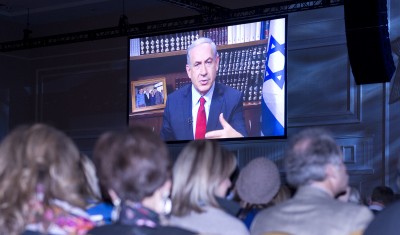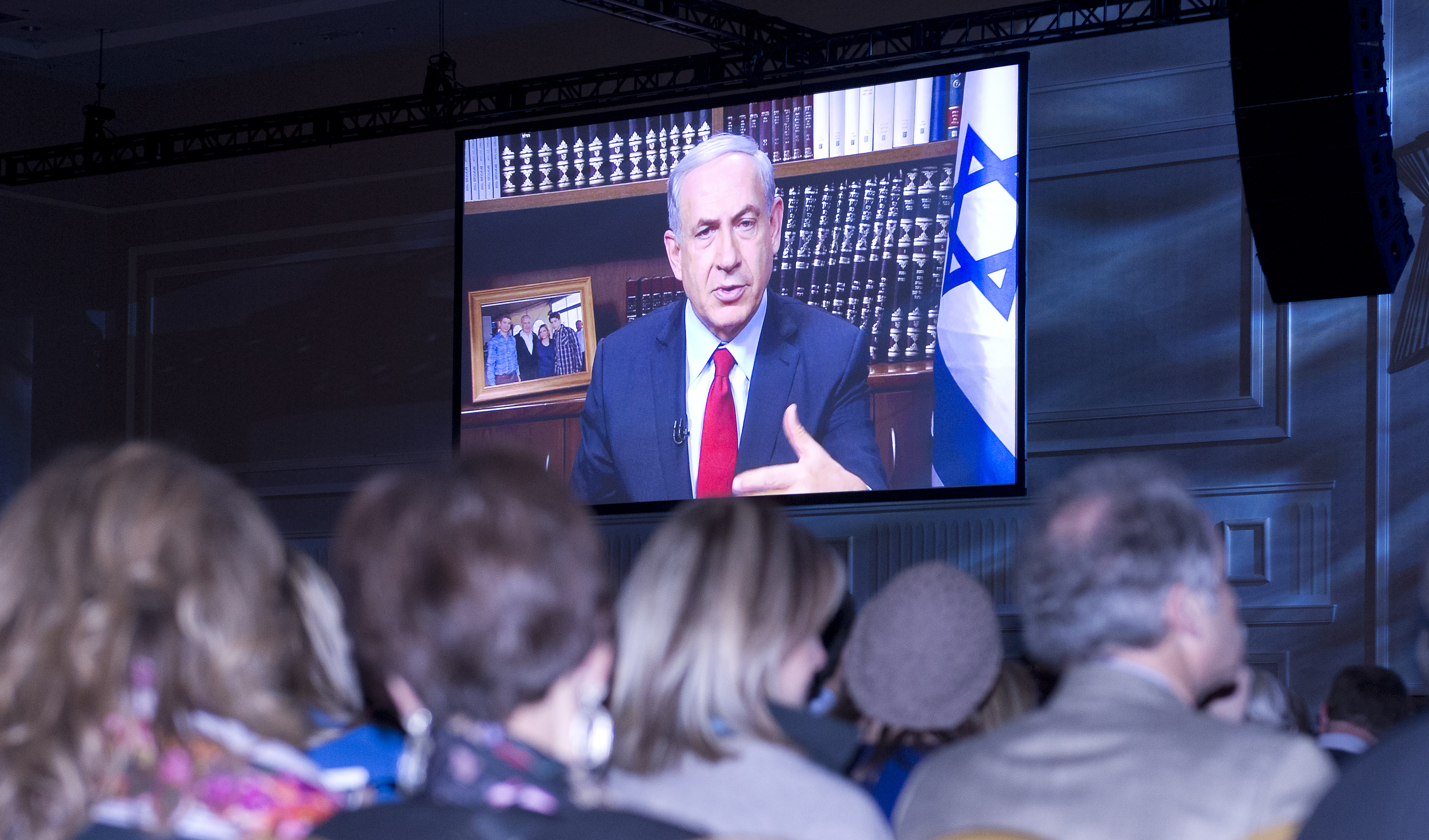
I came to the Jewish Federations of North America’s General Assembly (JFNAGA) for two reasons: I love the Jewish community, and I am a Zionist who firmly believes in a Jewish and democratic state of Israel with internationally recognized borders living alongside a Palestinian state.
I was excited to attend this conference featuring some of the world’s most powerful Jewish philanthropic organizations and leaders, though also fearful of how the conversation on Israel-Palestine would play out during a time of heightened conflict.
My activism on the Israeli-Palestinian conflict stems from my experience in Jewish communities, where I was taught to strive for peace and justice. My summer camp days were filled with singing Dan Nichols’ version of “B’tzelem Elohim” – the idea that we are all created equally in the image of God, and I often walked past a mural with the saying “tzedek, tzedek tirdof – justice justice shall you pursue.” I was taught that being Jewish means caring about the world, and believing that we cannot have peace until people of all race, class, gender, sexuality, age, and size are given equal and full rights. As we were once slaves in the land of Egypt, it is our obligation to take that shared traumatized history, and to practice tikkun olam, to repair the world.
Throughout the entirety of the conference, Israel was almost exclusively spoken of as a threatened underdog, suffering from anti-Semitism and a biased media. Professionals, leaders, and panelists spoke about the Israeli lives that were lost this summer, but never mentioned any of the lives lost on the “other side.” There was never an opportunity to mourn the Palestinian lives lost in Gaza, to see them as humans who were also created b’tzelem elohim. During one of the plenaries, the mayor of Sderot came to talk about how Israeli lives were jeopardized and compromised this summer. Of course, having to run to bomb shelters within fifteen seconds is horrific, and no one should have to live that way. I am grateful that our community was able to remember and mourn those lives. However, I couldn’t help but think, what about the Palestinians who didn’t have bomb shelters to run to?
How can we hold Israel accountable to its Jewish values and follow the Gemara’s teaching, “If someone destroys one soul it is as if he destroyed the whole world?” The Jewish community should not have to choose between valuing Israeli life and Palestinian life, but should recognize that all lives matter.
During a Jewish education and camp panel, four middle-aged adults spoke of their ideas on how to cultivate growth in Jewish youth programs. Without any Millennials on the panel, the audience was treated to an out-of-touch discussion of what young Jews want, and how they need to prepare themselves for college campuses and other diverse settings.
During the question–and–answer section of the panel, a J Street U student asked the panelists how they could improve and deepen their Israel education initiatives. The panelists seemed very surprised to even get the question. They stressed the importance of having Israeli staff members at Jewish summer camps, so that when a camper enters college, he or she can see an Israeli as more than just a soldier, but as a friend.
Is that all the Israel education that Jewish children require? We always talk about putting a face to an Israeli, but when can we start putting a face to a Palestinian? How can we end the conflict if we never see a Palestinian as a person created in b’tzelem elohim, but only as an enemy? It is a disservice to American Jewish Millennials to not address Israel’s extensive political and social challenges at a time when Israelis face one of the most important political choices in their history.
The BDS movement was also a major topic of discussion at the conference. Almost all of the speakers and panelists spoke of it as not only anti-Israel, but anti-Semitic. To set the general mood during the plenary on BDS, the conference organizers projected a terrifying backdrop featuring such imagery as a swastika superimposed on an Israeli flag and the slogan “Israel: The 4th Reich.” The message was loud and clear: all supporters of BDS are hateful and extreme. At another panel I asked a representative of the Israel on Campus Coalition how he differentiates between anti-Israel and pro-Palestinian activism – did he think they could ever be distinguished? He responded that all activism that includes support for BDS, as far as he’s concerned, is not only anti-Israel, but anti-Semitic. Meanwhile the actual students on the panel, rather than echoing such rhetoric, urged dialogue and outreach – but their message seemed to go unheard.
After this incident, and at many other times during the conference, I felt my ears ringing from a constant cacophony of Jewish exceptionalism. Speakers and participants kept touting Israel for being the only party in the region truly committed to peace- even though the events of the past few years have called this commitment into question for many American Jews and even for many Israelis. The GA seemed committed to promoting an idealized, Disneyland version of Israel at the expense of the actual people living there, both Israeli and Palestinian. While violence raged in Jerusalem, the GA showcased a country without an occupation, flowing with milk and honey.
It’s nice to celebrate success and feel good about what we have accomplished. But when is the time for introspection and self-reflection?
As one of 20 J Street U students at the conference, I left asking myself a lot of questions. When are major Jewish institutions going to become more representative of progressive Jewish voices, and of young people? When are they going to speak about Palestinian people as something other than a terrifying threat to the Jewish people and the State of Israel? When will we put our power, privilege and success toward creating lasting peace between Israelis and Palestinians?
When are we going to stop patting ourselves on the back and start looking carefully in the mirror?
Madeline Winard is a student at UC Santa Cruz.

